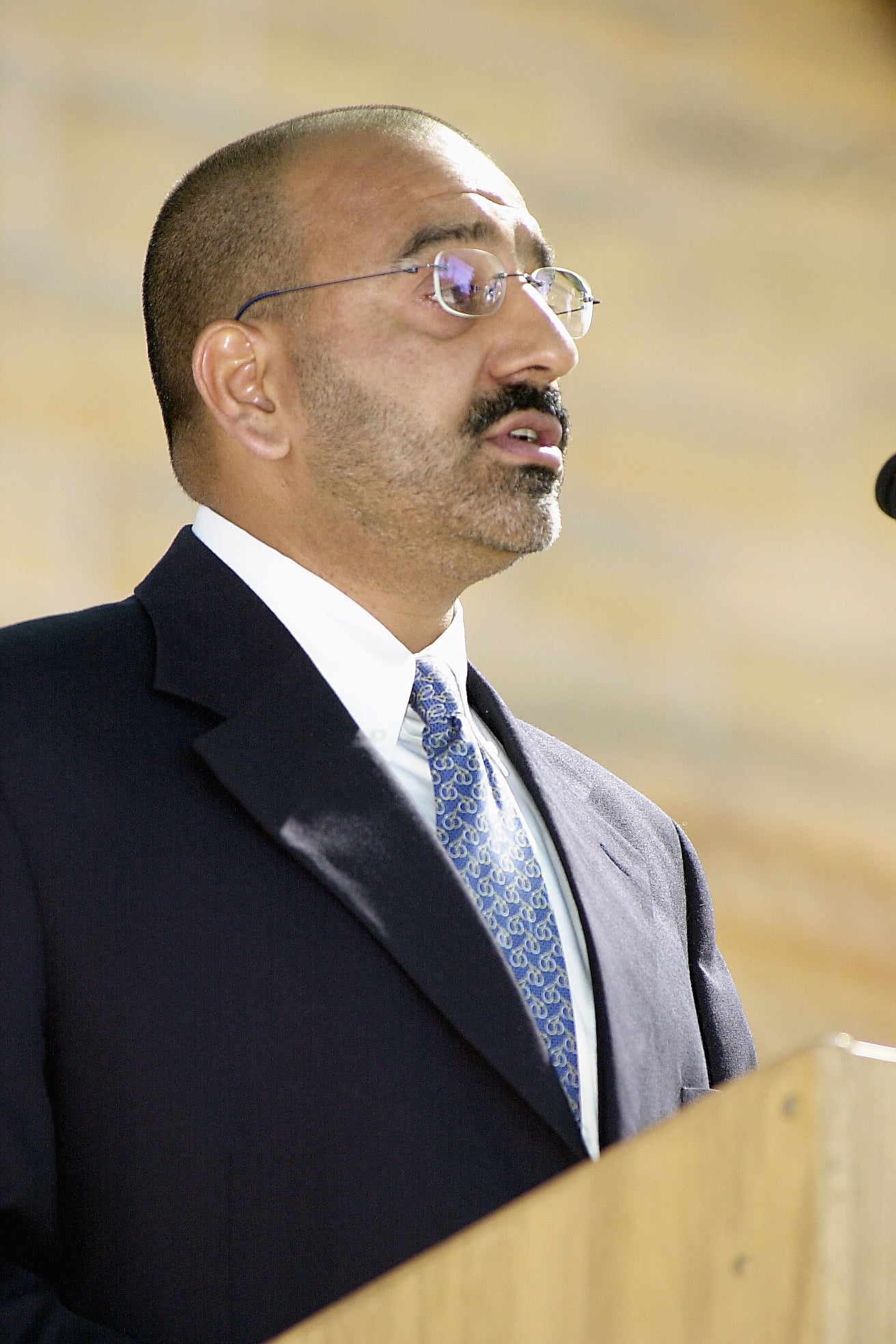At Baccalaureate, Moosa calls for global consensus for justice, human rights
Imam Ebrahim Moosa drew on his knowledge of South Africa’s recent battles over apartheid to frame his talk, which explored the positive and negative sides of globalization.

Ebrahim Moosa Moosa, associate dean for religious life, delivers the Baccalaureate address. (Image credit: L.A. Cicero)
This year’s Baccalaureate Celebration was “a feast of and for the world,” in the words of Dean of Religious Life Scotty McLennan. An eclectic audience of graduating students and their parents, families and friends turned out Saturday to hear readings, speeches and music from a host of international faith traditions.
The bright colors of university flags stood out against graduates’ somber robes as the procession strode to the stage at the north portal of the Inner Quad. Between palms and flowering trees, row after row of listeners snapped photos and craned necks toward the morning’s speakers and performers.
McLennan welcomed the audience, while graduating seniors read selections from Indian poet Rabindranath Tagore, a Native American story and the Quran. A cappella group Talisman performed a rousing African song in Zulu and English. The message: “Evil has no power! He has been cheated and flees far from us.” Later, Stanford Taiko drummed out a musical blessing that echoed around the Quad.
And Ebrahim Moosa’s baccalaureate address was a thoughtful send-off for seniors.
Moosa, visiting associate professor in the Religious Studies Department and an associate dean for religious life, is a fourth-generation South African of Indian roots. An Islamic imam, or community leader, he has been at Stanford since 1998. The address — which explored both the positive and negative sides of globalization — was also Moosa’s farewell to Stanford, since he’s leaving this week to take a faculty position at Duke University.
Moosa drew on his knowledge of South Africa’s recent battles over apartheid to frame his talk.
“Exactly 25 years ago,” he said, “the youth of South Africa took the struggle against apartheid to the streets.” Known as the Soweto uprising, it was an early step toward democracy in his native country, Moosa said.
But it was not just South Africans who forced change. “The unsung heroes,” he said, were people from around the world who worked for apartheid’s overthrow.
“Just as the movement against slavery was a great victory in retrieving our humanity, so too was the struggle against apartheid a means of globalizing our humanity,” Moosa said.
While global action helped end apartheid, globalization has its downside: It can force an unwanted sameness on diverse people. Only complex notions of justice can help us “to be able to be different and [at] the same time to also claim the right to be the same,” Moosa said.
Part of the commitment to justice necessitates an honest critique of the United States’ actions, he continued. Moosa noted, for example, that while 33 nations have supported the creation of an International Criminal Court to try crimes against humanity, the United States — Moosa’s adopted home — has refused to do so.
“There is something odious when the morally strong try to insulate themselves against accountability, when it is the very standard they advocate for others to observe,” Moosa said.
And Moosa criticized some countries’ attempts to demonize other nations or peoples as “a pathological ‘other.'”
“Is it not perplexing to observe how some nations calmly justify the acquisition of weapons of mass destruction for themselves, but when their opponents acquire the same, then they are described as rogues and terrorists!” Moosa argued that any country with these weapons “is tainted by the immorality of such instruments of destruction.”
Moosa also derided the globalization of American values and the insistence upon a single “liberal capitalist way” for the entire world. “That is the cruel way. … That is the way that ends all cultures and destroys diversity.”
Instead, a new global consensus for justice and human rights should emerge, he argued. Moosa concluded by urging the promotion of “nonpartisan human rights values and practices, the equitable distribution of the world’s resources and the respectful use of the environment.”
Yoav Schlesinger, a graduating senior in Jewish studies, followed Moosa’s talk with reflections about the place of God at Stanford. “We seal God in an airtight container,” he lamented. Students would be better equipped to handle ethical decisions if they thought about God, Schlesinger said.
“I see opening the God-box as one of the tasks of this university,” he said.
